 It is my opinion that The Wire is the greatest show in the history of television. Obviously I have not watched every show ever, so I suppose I can’t know for sure, but I have watched and read about my fair share of TV, and I’m certainly not the only one to hold this belief. I just feel that when you combine its exactness, authenticity, humor, drama, philosophy, etc. with its gigantic scope, you find a piece of visual literature that stands head and shoulders above any other work of the same medium. This is why Harvard, our country’s oldest institution of higher learning, started using it to educate its students almost immediately after the series finished. Watching it is to witness art that feels like its living and breathing.
It is my opinion that The Wire is the greatest show in the history of television. Obviously I have not watched every show ever, so I suppose I can’t know for sure, but I have watched and read about my fair share of TV, and I’m certainly not the only one to hold this belief. I just feel that when you combine its exactness, authenticity, humor, drama, philosophy, etc. with its gigantic scope, you find a piece of visual literature that stands head and shoulders above any other work of the same medium. This is why Harvard, our country’s oldest institution of higher learning, started using it to educate its students almost immediately after the series finished. Watching it is to witness art that feels like its living and breathing.
The Wire, at first glance, is simply another cop or crime show, but in reality it is far different than any that has come before (in fact, part of creator David Simon’s pitch to get HBO to green-light the show was so nobody who “sees HBO’s take on the culture of crime and crime fighting can watch anything like “C.S.I.” or “N.Y.P.D. Blue” or “Law & Order” again without knowing that every punch was pulled on those shows”). Instead, the show’s focus is really about the entire city of Baltimore, and if construed even more broadly, modern day, capitalist American society. Other pantheon shows like Breaking Bad or The Sopranos hone in on humanity with a microscope by being laser focused on singular persons like Walter White or Tony Soprano. The Wire, though it too presents story arcs of individual characters that are as charged emotionally as any you might find elsewhere, also zooms out, investigating massive cultural institutions like education, government, unions, drugs, and media. In fact, it is this dichotomy – the individual vs. the institution – that I want to discuss today.
<The rest of this Blogcat contains major spoilers through the series finale, so caveat emptor. But honestly, if you haven’t seen it, and the paragraphs above weren’t enough to convince you to go do so, then I don’t know what will. I know it’s a big commitment, and it can seem a bit slow at first, but I cannot emphasize enough how amazing this show is.>
I personally started watching The Wire almost six years ago, at the behest of my now-fiancee Anna (a suggestion for which I am forever grateful) during my Senior year at Lafayette, and have since watched the 60-hour-long series at least a dozen times. I make analogies to the show all the time based on things that happen in everyday life (e.g., the Frank Sebotka Memorial Bullpen outside the Nationals Stadium). I have quoted it numerous times on this website before, and written about how, for strange reasons, I take pride in my knowledge of the show.
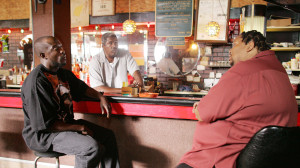 In fact, it is this knowledge that indirectly inspired me to write this Blogcat. I was at a bar with some friends, and in casual conversation one of them quoted a Proposition Joe line – “buy for a dollar, sell for two” – that was a perfect metaphor, yet it never would have crossed my mind. Construing this as a sign I was getting rusty – it had been awhile since my last watch-through – I fired up HBOGo and started to again plow through from the beginning.
In fact, it is this knowledge that indirectly inspired me to write this Blogcat. I was at a bar with some friends, and in casual conversation one of them quoted a Proposition Joe line – “buy for a dollar, sell for two” – that was a perfect metaphor, yet it never would have crossed my mind. Construing this as a sign I was getting rusty – it had been awhile since my last watch-through – I fired up HBOGo and started to again plow through from the beginning.
This rewatch was a good reminder of how much I desperately love this show – I literally rewound a clip of Rawls calling McNulty a swollen asshole 3-4 times and cackled each time – and in reflecting on how it truly does mean so much to me, I figured I should probably write something about it.
The thing that first stood out to me about what makes The Wire so unique is that it places equal emphasis on both the police and the criminals they pursue. Sure, McNulty is nominally the main character and protagonist, but it’s not as if we spend significantly more time with him than we do with D’Angelo and Stringer. Traditional cop shows focus only on the policing side of things, and we are left viewing the criminals purely as felons, and, as a result, completely non-human. The Wire, instead, turns these deviants in vibrant, charismatic human beings. We are left with characters who, though many of them are evil, are an absolute blast to watch from your couch.
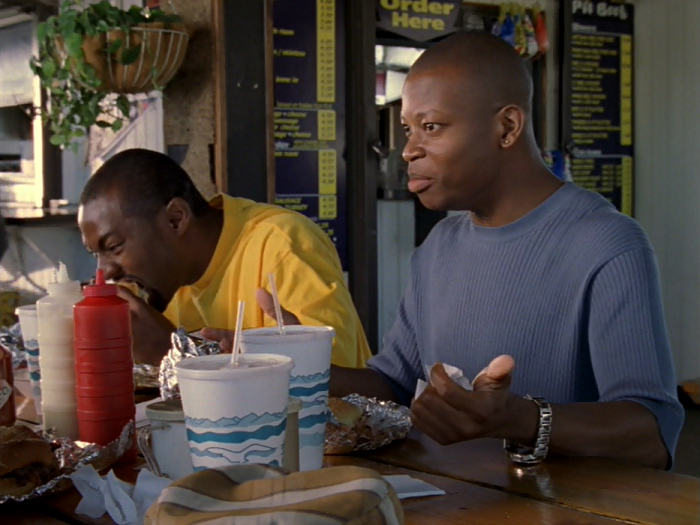 Take Wee-Bey, for instance, who’s inarguably a terrible person. In the first season alone, we see him kill many people – Orlando, Little Man, Nakeesha Lyles (the female security guard who witnessed D’s murder in the opening episode) – to the point that Avon tells him, “you need a scorecard to keep up wit’ yo lethal ass.” Yet we still love him as a character. We are delighted to learn of his fish tanks, and can laugh when he puts too much spice on his food.
Take Wee-Bey, for instance, who’s inarguably a terrible person. In the first season alone, we see him kill many people – Orlando, Little Man, Nakeesha Lyles (the female security guard who witnessed D’s murder in the opening episode) – to the point that Avon tells him, “you need a scorecard to keep up wit’ yo lethal ass.” Yet we still love him as a character. We are delighted to learn of his fish tanks, and can laugh when he puts too much spice on his food.
The same thing goes for many other characters on the street. Despite the fact that Chris and Snoop are tremendously evil people, that doesn’t mean we don’t get pumped up when Snoop goes to the hardware store and buys “gun powder activated, 27 caliber, full auto, no kickback, nail-throwing mayhem.” We still feel sympathy for her when, seconds before Michael kills her, he tells her, “you look good, girl.”
 By including both cops and criminals, we not only add color to the lives of the latter group, but we are also able to draw parallels between the two, because on the law-enforcement side, we find cops who don’t always uphold our legal system. As the Deputy of Operations, Burrell forces the Major Crimes Unit to give back the $20k they lawfully took out of Clay Davis’ driver Dede’s car so he can protect his political interests and allies. Herc and Carver each pocket a wad of cash during the raid of Barksdale’s main stash-house. McNulty drinks and drives – like, all the time.
By including both cops and criminals, we not only add color to the lives of the latter group, but we are also able to draw parallels between the two, because on the law-enforcement side, we find cops who don’t always uphold our legal system. As the Deputy of Operations, Burrell forces the Major Crimes Unit to give back the $20k they lawfully took out of Clay Davis’ driver Dede’s car so he can protect his political interests and allies. Herc and Carver each pocket a wad of cash during the raid of Barksdale’s main stash-house. McNulty drinks and drives – like, all the time.
Some people are cops, some are robbers, but they’re all still people. True, they’re on different sides, light and dark, but they’re still all chess pieces on the same board.
Omar makes this point famously, addressing Levy in the courtroom during Bird’s trial: “I got the gun, you got the briefcase…. all in the game, tho, right?”
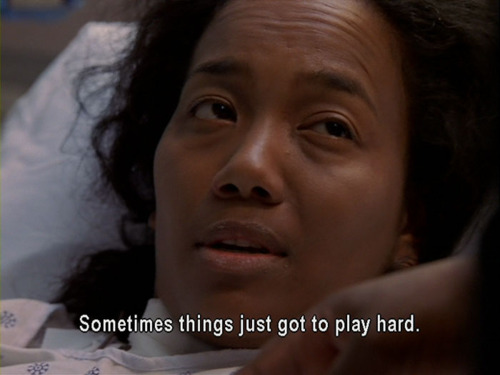 Some of these criminal actions aren’t done for purely selfish or destructive reasons, either, which further complicates our rendering of a moral verdict. To this point, Sophie Fuggle has noted that characters on the show are often put into situations where they must “do the wrong thing for the right reasons, or do the right thing for the wrong reasons.” For example, after Kima gets shot during an undercover operation, she is able to identify Little Man as one of the shooters, but refuses to identify Wee-Bey as the other, despite Bunk’s “fat finger” pointing her to the culprit. She truly doesn’t remember seeing him, so she’s abiding by the law, but since we, as the audience, know that it was Wee-Bey, we get extremely frustrated at her being so stubborn. Why does she have to take the legal high-ground, when it would lead to the righteous outcome?
Some of these criminal actions aren’t done for purely selfish or destructive reasons, either, which further complicates our rendering of a moral verdict. To this point, Sophie Fuggle has noted that characters on the show are often put into situations where they must “do the wrong thing for the right reasons, or do the right thing for the wrong reasons.” For example, after Kima gets shot during an undercover operation, she is able to identify Little Man as one of the shooters, but refuses to identify Wee-Bey as the other, despite Bunk’s “fat finger” pointing her to the culprit. She truly doesn’t remember seeing him, so she’s abiding by the law, but since we, as the audience, know that it was Wee-Bey, we get extremely frustrated at her being so stubborn. Why does she have to take the legal high-ground, when it would lead to the righteous outcome?
The most obvious example of this, of course, is McNulty staging crime scenes to fake the acts of a serial killer who in reality doesn’t exist. His motivations for doing so, while influenced by heavy narcissism, are fairly altruistic in that he’s attempting to resource an investigation of the murders and drug trafficking committed by Marlow and crew. According to the law, McNutty does the wrong thing, but he does so for the right reasons. So can we really blame him? It’s complicated.
“Thin line between heaven and here.”
This isn’t the only way in which the complications that arise from motivation and circumstance manifest themselves, either. In fact, that also ties into the main, deterministic philosophy of the entire show: in a capitalist society, nothing happens in a vacuum, and thus none of us are truly free.
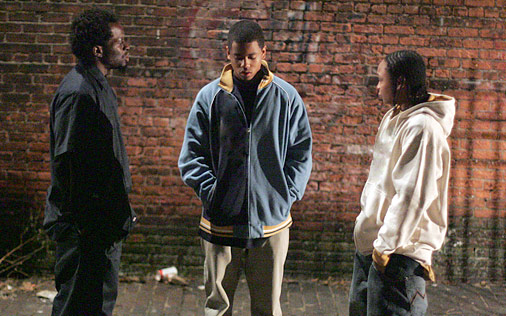 Take Michael Lee, for example. Michael shows up in season 4 as a kid with a lot of talent; so much so, in fact, that Marlo notices him from afar, yet Mike turns down Marlo’s money when Monk offers it to him for free. He doesn’t want to be involved in #TheGame, or have any attachments to it. Later, however, we meet his dopefiend mother, and her even-worse child-molesting boyfriend. That male presence ultimately poses such a danger to Mike’s little brother Bug that Mike pledges his loyalty to Chris and Snoop in exchange for them helping to save Bug from the same fate he faced. By the end of the series, Michael has killed people, hardened (#Metapod) his personality, and become Omar 2.0 – a criminal by anyone’s definition. Yet, like McNulty, he was doing the wrong things for the right reasons.
Take Michael Lee, for example. Michael shows up in season 4 as a kid with a lot of talent; so much so, in fact, that Marlo notices him from afar, yet Mike turns down Marlo’s money when Monk offers it to him for free. He doesn’t want to be involved in #TheGame, or have any attachments to it. Later, however, we meet his dopefiend mother, and her even-worse child-molesting boyfriend. That male presence ultimately poses such a danger to Mike’s little brother Bug that Mike pledges his loyalty to Chris and Snoop in exchange for them helping to save Bug from the same fate he faced. By the end of the series, Michael has killed people, hardened (#Metapod) his personality, and become Omar 2.0 – a criminal by anyone’s definition. Yet, like McNulty, he was doing the wrong things for the right reasons.
Michael being in that situation is not his fault. He was born into it. Should we really blame him? The Wire argues that we should not – or at least, not entirely.
After D gets popped with a kilo, when he’s in the police interrogation room talking to Bunk and McNulty, he comes out and tells us this truth:
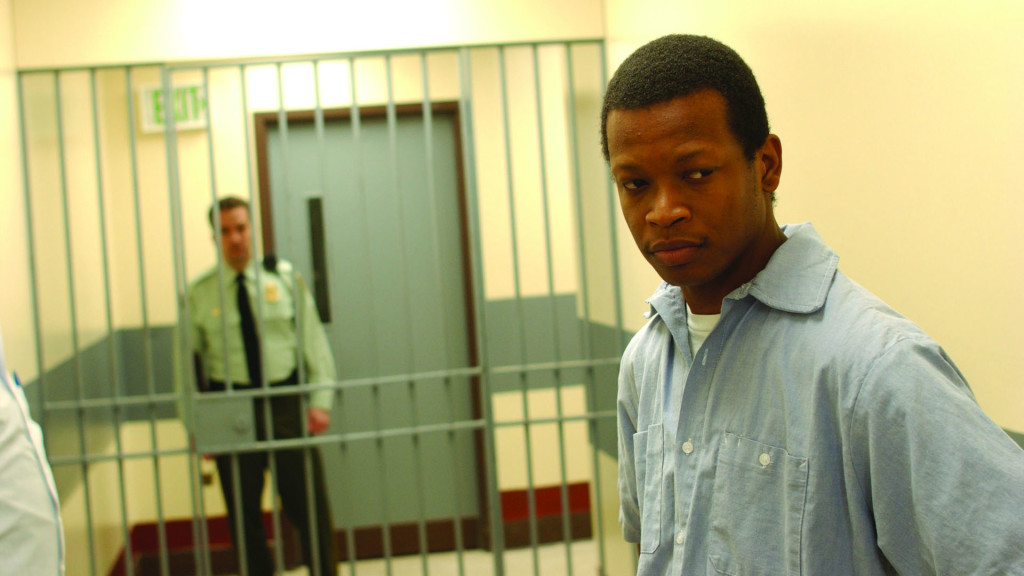 “Y’all don’t understand … You grow up in this shit. My grandfather was Butch Stamford. You know who Butch Stamford was in this town? All my people, man – my father, my uncles, my cousins – it’s just what we do … I was courtside for eight months, and I was freer in jail than I was at home.”
“Y’all don’t understand … You grow up in this shit. My grandfather was Butch Stamford. You know who Butch Stamford was in this town? All my people, man – my father, my uncles, my cousins – it’s just what we do … I was courtside for eight months, and I was freer in jail than I was at home.”
This idea of freedom, and free will, is at the heart of what this show is all about. Human nature is a powerful thing, true, but it doesn’t exist in isolation. Nurture is just as powerful, arguably even more so.
D’Angelo points this out again during his season 2 book club when they discuss The Great Gatsby (a line which I’ve quoted many times):
“The past is always with us, and where we come from, what we go through, how we go through it, all this shit matters. Like at the end of the book, you know, boats and tides and all. It’s like you can change up, right, you can say you somebody new, you can give yourself a whole new story. But, what came first is who you really are and what happened before is what really happened. And it don’t matter that some fool say he different cuz the only thing that make you different is what you really do, what you really go through.”
What the show is able to demonstrate, as Dr. Andrew Moore argues, is that “the fates of everyone living in Baltimore are determined by enormous institutional forces beyond their control.” Simon, too, describes the show in much the same way, that it exposes “the lie behind our national claim to equality of opportunity.” This inequality of opportunity is, the show argues, the fundamental flaw of American capitalism as a system of social justice.
Simon again calls attention to this inherent issue during a speech at the Festival of Dangerous Ideas in Sydney:
“People are saying I don’t need anything but my own ability to earn a profit. I’m not connected to society. I don’t care how the road got built, I don’t care where the firefighter comes from, I don’t care who educates the kids other than my kids. I am me. It’s the triumph of the self. I am me, hear me roar.”
The Wire argues that capitalism is wrong in this case by illustrating how all the institutions in our society are interconnected and ultimately influence everything. Media, schools, politics, crime – they’re one big and tangled web, social constructs “wired” together in a system where one decision at the top or bottom creates a butterfly effect elsewhere, in the end affecting individual people.
 Mayor Clarence Royce hosts poker nights as a way to acquire under-the-table political contributions from the likes of real estate developer Andy Krawczyk. Krawczyk gets investments from the likes of narcotics mogul Stringer Bell. And how does Stringer stay out of jail to maintain his financial clout? He orders Bodie to execute Wallace.
Mayor Clarence Royce hosts poker nights as a way to acquire under-the-table political contributions from the likes of real estate developer Andy Krawczyk. Krawczyk gets investments from the likes of narcotics mogul Stringer Bell. And how does Stringer stay out of jail to maintain his financial clout? He orders Bodie to execute Wallace.
Even further, not only are these institutions all related, but they don’t care about individuals, either. “Pawns, man, they get capped quick,” D tells Bodie in the famous chess scene.
In fact, this is what Simon set out to illustrate in creating the show in the first place:
“We’ve basically taken the idea of Greek tragedy and applied it to the modern citystate. What we were trying to do was take the notion of Greek tragedy, of fated and doomed people, and instead of these Olympian gods, indifferent, venal, selfish, hurling lightning bolts and hitting people in the ass for no reason—instead of those guys whipping it on Oedipus or Achilles, it’s the postmodern institutions . . . those are the indifferent gods.”
 Nowhere is this more apparent than in the cases of Dukie and Namond. They both grow up round the way in less than ideal circumstances. Namond is Wee-Bey’s son, born into a family with a legacy of dealing drugs. Part of that family is his mother (God, she’s the worst), who is unable to envision any future for her son outside of that legacy, despite how special and intelligent Namond has shown himself to be. Dukie is intelligent and special too, but his environment growing up is arguably even worse. Both of them attend the same school are in the same class, but neither is a true fit for that educational institution; Namond because he mouths off too much, Dukie because he over-performs on tests. And the institution, a gigantic machine concerned most with improving stats, is too busy to mind that that’s the case.
Nowhere is this more apparent than in the cases of Dukie and Namond. They both grow up round the way in less than ideal circumstances. Namond is Wee-Bey’s son, born into a family with a legacy of dealing drugs. Part of that family is his mother (God, she’s the worst), who is unable to envision any future for her son outside of that legacy, despite how special and intelligent Namond has shown himself to be. Dukie is intelligent and special too, but his environment growing up is arguably even worse. Both of them attend the same school are in the same class, but neither is a true fit for that educational institution; Namond because he mouths off too much, Dukie because he over-performs on tests. And the institution, a gigantic machine concerned most with improving stats, is too busy to mind that that’s the case.
Namond, though, by bonding with Bunny Colvin, gets saved from being chewed up by the system. Dukie, sadly, has no such luck.
In fact, Namond is shown to be the rarity. Most are, instead, like Dukie, or Randy, or Michael. Or, perhaps most tragically, they’re like Wallace, who ominously states about the Pit, “This is me, yo, right here.”
One of the things that makes The Wire so brilliant is how it not only illustrates time and again that institutions are failing individuals, but also why that’s the case. What the show does, and does well, is it continues to hammer home this idea that institutions aren’t autonomous things with their own agenda. Instead, they are constituted, and ultimately run by, individual persons who are motivated and incentivized by selfish goals, rather than by the desire to accomplish the objectives of that institution.
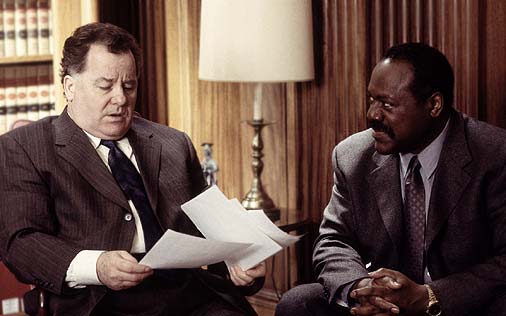 All throughout the show, we see this conflict between what’s good for the individual and what’s good for the institution. Judge Phelan is willing to throw his political power behind the Barksdale probe, even busting Burrell’s balls about it, until all of a sudden his job is in jeopardy and he needs to keep his allies happy. Tommy Carcetti is introduced to the show as being somewhat well-intentioned, but as Mayor he ultimately refuses to take the governor’s handout, which would have solved the education system’s budget crisis, because doing so would have gotten in the way of his own political aspirations.
All throughout the show, we see this conflict between what’s good for the individual and what’s good for the institution. Judge Phelan is willing to throw his political power behind the Barksdale probe, even busting Burrell’s balls about it, until all of a sudden his job is in jeopardy and he needs to keep his allies happy. Tommy Carcetti is introduced to the show as being somewhat well-intentioned, but as Mayor he ultimately refuses to take the governor’s handout, which would have solved the education system’s budget crisis, because doing so would have gotten in the way of his own political aspirations.
Carcetti’s personal goals didn’t line up with actually doing the job he was elected to do. Then, when time came for him to choose, Carcetti prioritized himself over the institution, and the kids got screwed over.
D’Angelo describes this dynamic in prison when his baby mama finally pays him a visit:
“Donnette, they playin’ you with that, ‘we family and it’s all about love,’ that’s how they do. When they got no more use for you that family shit disappears. It’s just about business, Donnette.”
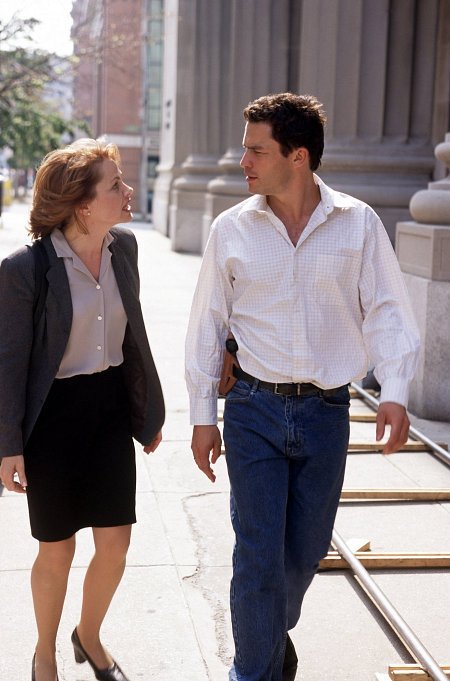 McNulty, too, voices his frustration with this concept. After Kima gets shot, the cops are unable to find Savino, the Barksdale dealer who was pretending to sell Orlando dope, so Jimmy and Ronda Pearlman go down to Levy’s office. Jimmy, caring passionately about his partner and friend seriously injured in the line of duty, vehemently threatens Levy if the lawyer is unable to find Savino. This is a move which takes Ronda by surprise, and one which she complains to McNulty about later:
McNulty, too, voices his frustration with this concept. After Kima gets shot, the cops are unable to find Savino, the Barksdale dealer who was pretending to sell Orlando dope, so Jimmy and Ronda Pearlman go down to Levy’s office. Jimmy, caring passionately about his partner and friend seriously injured in the line of duty, vehemently threatens Levy if the lawyer is unable to find Savino. This is a move which takes Ronda by surprise, and one which she complains to McNulty about later:
“The point is that Maury Levy is a past officer of the monumental bar association, and unless I want to spend my whole life as a fucking A.S.A.., I can’t spend my afternoons pissing on people who matter.”
“Another career in the balance,” Jimmy disgustedly responds.
This central conflict is shown through many other examples, too, but it is laid out explicitly by Daniels, when he catches Carver leaking secrets to Burrell:
“There comes a day when you gonna have to decide whether it’s about you or it’s about the work.”
That, right there, is the root of capitalism’s issue. That “you” and “the work” don’t line up.
Most frequently, this results in the individual being screwed over. This is famously depicted in the argument about Chicken McNuggets, when Wallace can’t believe D when he informs the boy that the inventor of such a delicious and popular cuisine didn’t get rich off his idea:
“Please, the man who invented them things, just some sad-ass down at the basement of McDonald’s, thinkin’ up some shit to make some money for the real players…. Fuck “right.” It ain’t about right, it’s about money. Now you think Ronald McDonald gonna go down in that basement and say, “Hey, Mr. Nugget, you the bomb. We sellin’ chicken faster than you can tear the bone out. So I’m gonna write my clowny-ass name on this fat-ass check for you”?”
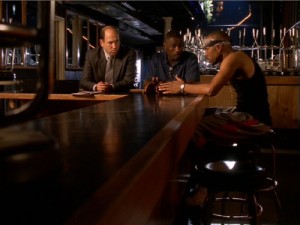 Of course, this isn’t always a problem for everybody, because, as was covered above, capitalism is not a system in which everyone has equal opportunity. Instead, differences in a person’s power and class result in things playing out differently for that person. Those in power tend to stay in power, and use those below them to do so.
Of course, this isn’t always a problem for everybody, because, as was covered above, capitalism is not a system in which everyone has equal opportunity. Instead, differences in a person’s power and class result in things playing out differently for that person. Those in power tend to stay in power, and use those below them to do so.
This is why I feel Simon is a bit off when he describes these institutions as “indifferent gods… hitting people in the ass for no reason.” These institutions aren’t indifferent, at least not precisely. They certainly don’t care about the negative trickle-down caused by various decisions, but those decisions aren’t objective, either. And again, that is because institutions aren’t autonomous, amorphous entities that can act based on the reason they exist. Rather, these are social structures that are run by individuals who too often have prioritized themselves over “the work.”
Consider what happens to D when he gets caught with a kilo of heroin, and McNulty implores him to consider the fairness of his situation:
“Not that you messed up. You did everything right. Speed limit, turn signals, working taillights. Question you gotta ask is how’d those troopers know to pull you over? Someone else fucked up. You following me? But it’s you they’re gonna blame, and you who’s gonna do the jolt.”
After all, in a capitalist society, as Rawls tells Lester when the latter first transfers into Homicide:
“You do not play the game for yourself, you play it for us.”
Rawls is right, but by “us” he doesn’t mean the institution of law enforcement. Instead, he means those with power.
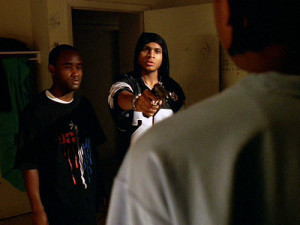 I mean, if you think about it, the higher up the food chain these characters get, the more likely they are to be able to play the game for themselves. Bodie is just a pawn in Barksdale’s organization, so when Stringer instructs him to kill Wallace, he really has no choice; as Bodie says to Poot, “look, the man gave the word, so we either step up, or we step the fuck off.” This is why so many of the lower-level drug enforcers have to “take the years” or “eat a charge.”
I mean, if you think about it, the higher up the food chain these characters get, the more likely they are to be able to play the game for themselves. Bodie is just a pawn in Barksdale’s organization, so when Stringer instructs him to kill Wallace, he really has no choice; as Bodie says to Poot, “look, the man gave the word, so we either step up, or we step the fuck off.” This is why so many of the lower-level drug enforcers have to “take the years” or “eat a charge.”
But when there are fewer people above you in that structure, you are more likely maintain your power to act selfishly. It’s not as if these power players play the game for the benefit of the rest of the institution, and it just happens to negatively affect another individual. Instead, they are still making decisions motivated by self-interest. In fact, they are even more likely to do so, because the way you gain power in these institutions is to act selfishly in the first place; those people don’t, as Daniels says, choose the work.
Stan Valcheck didn’t launch an entire investigative unit to determine who murdered the dead girls in the can, but instead because Frank Sebotka donated a stained glass window before he did. Barksdale didn’t have his broader organization’s interests at heart when he made them all take a plea bargain so he could minimize his jail time. Carcetti refused the bailout because he wanted to become Governor, not because it wouldn’t have helped his city.
No, they are able to do that because they are the ones in power, and because their selfish interests don’t line up with the jobs they’re supposed to be doing. Then, as human beings, they make the choice to prioritize themselves over the job, because the people that choose the work end up getting fucked.
It’s just like Avon tells us. “Play, or you gon’ get played.“
